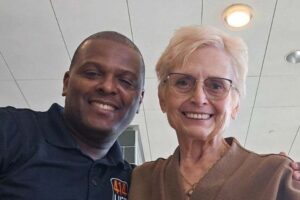Serving justice. Giving hope.
 Is there somebody you encountered only once who made you think about them often? In February, I came face-to-face with my somebody.
Is there somebody you encountered only once who made you think about them often? In February, I came face-to-face with my somebody.
I was more than curious when Marquette colleague Dr. Theresa Tobin reached out to say that a student in her class asked to meet with me. Theresa, an associate professor of philosophy, directs the Education Preparedness Program (EPP). EPP provides academic support and career-building resources for incarcerated and recently released students through Marquette’s Center for Urban Research, Teaching, & Outreach, in collaboration with partnering academic institutions and community organizations. That’s how Theresa met James.
James Price. The name didn’t register with me when the three of us had lunch at Marquette Law School’s Tory Hill. James insisted on paying. The conversation flowed easily enough as the 40-something-year-old spoke about his current work, which necessarily touched on the tougher subject of his previous time in prison. Paroled after serving 27+ years for homicide, James is employed through 414LIFE, a Froedtert & Medical College of Wisconsin hospital-based violence interruption program that treats violence as a disease. The goal: to save lives by interrupting the cycle of violence.
Among the program’s team of formerly incarcerated men serving as Violence Interrupters, James has a dangerous job. He taps past neighborhood and criminal experience as well as EPP-acquired mediation skills to meet victims and offenders of gun violence where they’re at. He mentors, helping steer them toward positive changes. Many of these individuals are kids. But that’s what makes James ideal for the job.
As lunch continued, James described a 14-year-old convicted of killing a teen walking down the street, mistaking a cocked cap for membership in a rival gang. As I listened, inspired by how James puts himself in danger each day by working with these kids, it clicked. He was the 14-year-old I sentenced back in the early 1990s for that senseless crime. Over the past two decades, I would think about that young kid in my court who thoughtlessly did the unthinkable. A criminal to be punished for the safety of the community, who received the harshest sentence I had given to a juvenile. A kid I sent to prison, with no chance for parole for a quarter century.
Yes, I remembered James. He was the somebody who was always in the back of my mind because, really, how could I forget the reaction of a child who, after hearing his sentence, said his life was over?! While his name escaped me with time, I often wondered how he was doing and what had become of him. Apparently, he never forgot what I had said to him: that when/if he got out of prison, his life was not over. He could have a productive and meaningful future. James shared how those words meant nothing to him at the time but, with nothing but time to think — 27 years, 7 months and 14 days to be precise — he came to realize that it had been the first occasion somebody expressed any hope in him. That hope helped shape his prison time and compelled him to take a course in restorative justice, launching his new journey.
I will never forget that lunch — or the name James Price — grateful to know now that by serving justice while giving hope decades ago, I was blessed with the grace to inspire James to do the same.
We all know and are somebody for somebody who can make things right. God moments are real.

